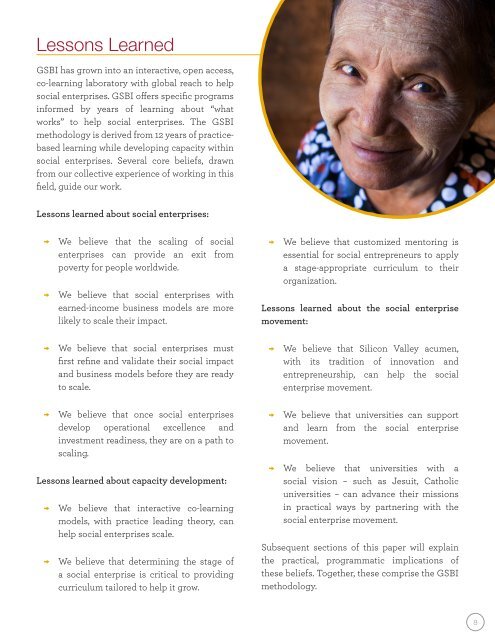GSBI+Methodology+for+Social+Entrepreneurship
GSBI+Methodology+for+Social+Entrepreneurship
GSBI+Methodology+for+Social+Entrepreneurship
You also want an ePaper? Increase the reach of your titles
YUMPU automatically turns print PDFs into web optimized ePapers that Google loves.
Lessons LearnedGSBI has grown into an interactive, open access,co-learning laboratory with global reach to helpsocial enterprises. GSBI offers specific programsinformed by years of learning about “whatworks” to help social enterprises. The GSBImethodology is derived from 12 years of practicebasedlearning while developing capacity withinsocial enterprises. Several core beliefs, drawnfrom our collective experience of working in thisfield, guide our work.Lessons learned about social enterprises:→→→→We believe that the scaling of socialenterprises can provide an exit frompoverty for people worldwide.We believe that social enterprises withearned-income business models are morelikely to scale their impact.→→We believe that customized mentoring isessential for social entrepreneurs to applya stage-appropriate curriculum to theirorganization.Lessons learned about the social enterprisemovement:→→We believe that social enterprises mustfirst refine and validate their social impactand business models before they are readyto scale.→→We believe that Silicon Valley acumen,with its tradition of innovation andentrepreneurship, can help the socialenterprise movement.→→We believe that once social enterprisesdevelop operational excellence andinvestment readiness, they are on a path toscaling.Lessons learned about capacity development:→→→→We believe that interactive co-learningmodels, with practice leading theory, canhelp social enterprises scale.We believe that determining the stage ofa social enterprise is critical to providingcurriculum tailored to help it grow.→→We believe that universities can supportand learn from the social enterprisemovement.→→We believe that universities with asocial vision – such as Jesuit, Catholicuniversities – can advance their missionsin practical ways by partnering with thesocial enterprise movement.Subsequent sections of this paper will explainthe practical, programmatic implications ofthese beliefs. Together, these comprise the GSBImethodology.8


